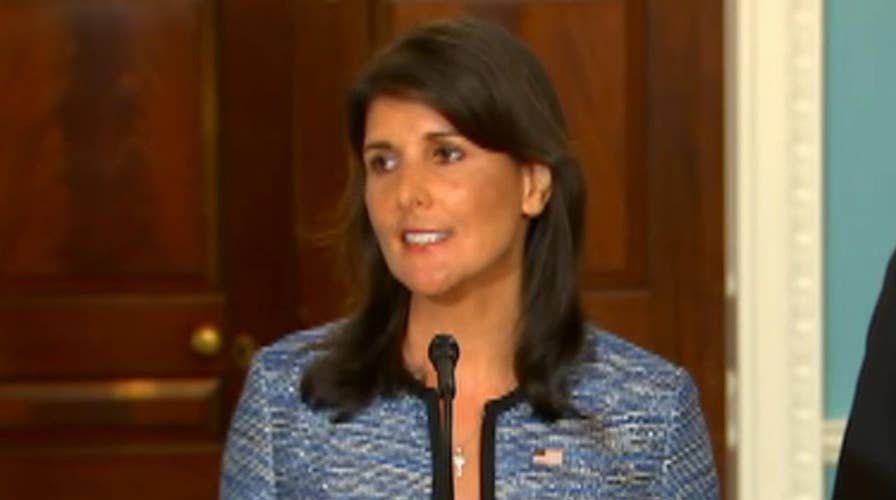Haley announces US withdrawal from UN Human Rights Council
U.S. ambassador to the United Nations blasts the Council for its 'politicized scapegoating of countries with positive human rights records.'
U.S. Ambassador to the United Nations Nikki Haley has chalked up another win, securing an arms embargo on South Sudan -- something that eluded the Obama administration.
South Sudan, which declared its independence from Sudan in 2011, has been beset by conflict and violence since 2013. But an arms embargo resolution introduced by the U.S. during the Obama administration was rejected by the Security Council in 2016.
The resolution on Friday squeaked through, only picking up the nine votes necessary to pass. France, the Ivory Coast, the Netherlands, Kuwait, Peru, Poland, the U.K. and Sweden all backed the U.S. While no members voted against the measure, Russia, China, Bolivia, Equatorial Guinea, Ethiopia and Kazakhstan all abstained.
The resolution also imposes a travel ban and asset freeze on a top South Sudanese official, as well as a former army chief. Opponents of the arms embargo had warned that it could derail peace talks, with South Sudan’s representative describing the resolution as a “slap in the face.”
"To pass a resolution at a time when the peace process is making advances, positive advances, this will turn the balance for those parties that are negotiating," he said. "The opposition will think the Security Council is on their side, so why should they really continue to negotiate? That's why this resolution is unfortunate."
But Haley, in line with the combative style she has brought to the role since she became ambassador last year, was tough in her criticism of South Sudanese leaders, as well as the prior inaction of the Security Council ahead of the vote.
“South Sudan’s people have endured unimaginable suffering and unspeakable atrocities. Their leaders have failed them,” she declared. “The Security Council had an opportunity to help put a stop to this, but we failed. We carry that burden with us. The United States is determined that we will not turn our backs on South Sudan’s people again.”
Haley has been a frequent critic of business-as-usual at the U.N. She recently decried the U.N. Human Rights Council as “a protector of human rights abusers, and a cesspool of political bias" as she announced America's withdrawal from the controversial body.
A Security Council diplomat noted that past attempts by the previous administration had failed, and suggested that Haley was the key factor in securing the resolution’s passage.
“I think Ambassador Haley’s new approach to the issue certainly helped garner support for the measure this time,” the diplomat told Fox News. “It’s quite an important step forward for the Council and the South Sudanese people.”
Haley visited the country in October and had to be evacuated from a camp after violence broke out. In remarks released later, she said that what she saw "is not what we thought we were investing in," a reference to the U.S.' position as top donor to the young nation.
HALEY EVACUATED FROM SOUTH SUDAN CAMP AFTER PROTEST VIOLENCE BREAKS OUT
“What we thought we were investing in was a free, fair society where people could be safe and South Sudan is the opposite of that,” she said at that time.
A recent U.N. report found that in six weeks, 232 civilians were killed including 35 children, and 120 women and girls were raped or gang-raped, while 63 children, elderly and disabled people were burned alive. The Security Council had threatened an arms embargo in May, but it had not been clear whether it would follow through.
The Ethiopian ambassador was one of the voices at the Security Council opposing the U.S.-drafted resolution, saying the peace process has “made notable progress” and now was not the time for such a resolution.
In her remarks on Friday, Haley said that the U.S. supports the peace process, but dismissed claims that an arms embargo would undermine talks.
“For negotiations to work, we must end the cycle of broken promises to stick to a ceasefire. Peace in South Sudan will not come by letting the parties get their hands on more weapons,” she said. “The opposite is true. Supporting an arms embargo will show the parties that we are fed up with delays and stalling.”
U.N. Secretary General Antonio Guterres, who had described the conflict as “horrific,” expressed hope that the arms embargo may lead to peace in the young nation.
"We take note of the Council’s decision and hope that it will encourage the leaders of South Sudan to end all fighting and return to peace, as the Secretary-General has repeatedly been calling for,” spokesman Farhan Haq told Fox News.
Multiple attempts at peace, including a 2015 peace deal and a cessation of hostilities agreement in December, have failed to stop the fighting. The ethnic violence has left tens of thousands dead, and led to 1.8 million fleeing in what is quickly becoming a major refugee crisis.
Fox News' Ben Evansky and The Associated Press contributed to this report.















































